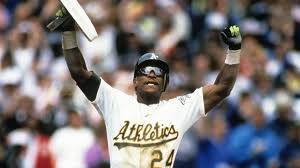When the conversation turns to the greatest athletes in history, names like Michael Jordan, Serena Williams, or Muhammad Ali often take the spotlight. But in the world of baseball, one name belongs in that same tier Rickey Henderson, the most electrifying leadoff hitter the sport has ever seen. He didn’t just play baseball he changed it.
Over a career that spanned 25 seasons and four decades, Rickey Henderson didn’t merely master the art of baseball; he redefined it. With speed, swagger, and a sharp baseball mind, Henderson revolutionized how the game is played from the top of the lineup, leaving behind a legacy that remains unmatched and likely untouchable.
The Rise of a Revolutionary
Born on Christmas Day in 1958 in Chicago and raised in Oakland, California, Rickey Henderson’s journey to baseball greatness was far from preordained. He was a multi-sport athlete in high school, excelling in football and baseball, but it was his unmatched speed and instincts on the diamond that caught scouts’ attention. Drafted by the Oakland Athletics in 1976, Henderson made his MLB debut in 1979. By the next season, he was already rewriting the record books.
In 1982, Henderson set a single-season record with 130 stolen bases a record that remains untouched and is unlikely to ever be approached again in the modern game. That year, he redefined what it meant to be a threat on the basepaths. Pitchers couldn’t sleep. Catchers couldn’t breathe. Every walk or single became a double in waiting.
Redefining the Leadoff Role
Before Rickey Henderson, the leadoff spot in the batting order was largely about “getting on base and letting the big guys drive you in.” It was a job for contact hitters, not stars. Rickey smashed that mold. He brought power, precision, and pressure to the leadoff role, becoming a one-man offensive weapon who could win games by himself.
He hit 297 home runs, including an astonishing 81 to lead off a game a record that still stands. Combine that with a career on-base percentage of .401 and his keen eye at the plate, and you’ve got a player who did everything a leadoff hitter was supposed to do and a whole lot more.
Where most players created offense with the bat, Rickey did it with his entire body: speed, timing, mental warfare. He turned routine base hits into multi-base threats. He made pitchers nervous before even stepping into the batter’s box. He wasn’t just a player he was a disruptive force.
Numbers That Don’t Seem Real
Let’s talk about the records:
- 1,406 career stolen bases — over 450 more than the next closest player (Lou Brock).
- 2,295 runs scored — the most in MLB history.
- 3,055 hits — including over 500 doubles and 66 triples.
- 2,190 walks — second all-time, behind only Barry Bonds.
These numbers don’t just stand out they stand alone. Henderson wasn’t just great; he was statistically unprecedented. And in an era that now values advanced analytics, Rickey’s career WAR (Wins Above Replacement) of 111.2 places him firmly among the game’s all-time elite.
More Than Just a Stat Machine
Rickey Henderson was known not only for what he did, but how he did it. His flair for the dramatic, his third-person interviews (“Rickey’s just being Rickey”), and his unforgettable celebrations made him a cultural icon. His confidence bordered on theatrical, but he backed it up with performance year after year, team after team.
Throughout his career, he played for nine different MLB teams, including notable stints with the Athletics, Yankees, Blue Jays, and Padres. No matter where he went, he remained productive. Even late into his career, he was stealing bases in his 40s, outpacing players half his age.
And yet, for all the flash, Rickey’s knowledge of the game was unmatched. He studied pitchers relentlessly, memorized tendencies, and had a sixth sense for the right moment to strike. He didn’t just steal bases; he took them with purpose, with precision, with intent.
Breaking Barriers and Defying Norms
Henderson’s style didn’t always fit the traditional mold. In an era when baseball often rewarded stoicism and conservatism, Rickey brought joy, emotion, and personality. He was unapologetically himself a brash, bold, Black athlete who celebrated his accomplishments loudly and publicly.
And that mattered. Henderson’s presence on the field challenged unwritten rules and reshaped how the game viewed expression. Today’s generation of players from Ronald Acuña Jr. to Fernando Tatís Jr. owe some of their creative freedom to trailblazers like Rickey.
Legacy of a Game-Changer
Rickey Henderson was inducted into the Baseball Hall of Fame in 2009, on his first ballot a no-brainer. In his acceptance speech, he said: “I’m the greatest of all time.” And while many laughed at the trademark bravado, few would argue the point.
Because Rickey didn’t just play baseball. He changed it.
- He made the leadoff spot sexy.
- He made base stealing an art form.
- He turned swagger into a weapon.
His records may never be broken. His style may never be matched. But his impact? It echoes in every aggressive baserunner, every confident young player, and every game that starts with fireworks from the very first pitch.
Final Word
In a sport that honors tradition, Rickey Henderson broke with it and in doing so, became one of baseball’s most enduring legends. He wasn’t just the greatest leadoff hitter of all time he was, and still is, a reminder that greatness can come in many forms. Sometimes it comes with a stolen base, a flip of the helmet, and a smile that says: You can’t stop me.
Because when Rickey ran, baseball followed.

